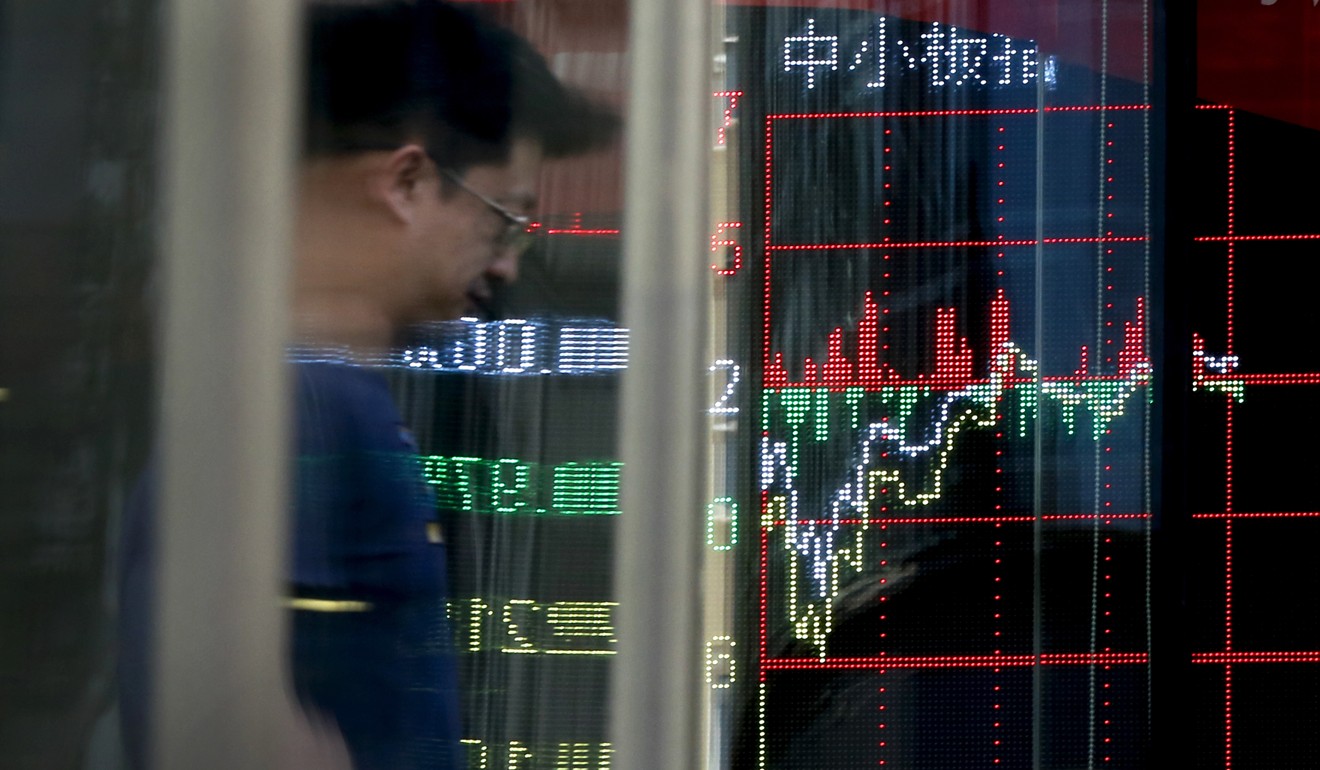A-share firms bank on wealth management products to boost books in slowdown
A-share firms’ holdings of wealth management products have risen from 7.1 billion yuan in 2012 to 743 billion yuan so far this year

Wealth management products (WMPs) have become the new darlings that China’s A-share companies look to for gains as they face an uphill task of shoring up profitability in their core businesses.
The buying spree surrounding the WMPs, a typical example of the country’s shadow banking system, added weight to suspicions about the corporate fundamentals in a precarious stock market where millions of investors are chalking up losses.
According to Hithink Royalflush Information Network, a financial information provider, 826 mainland-listed firms, or about a quarter of the companies on the Shanghai and Shenzhen stock exchanges, bought WPMs worth a combined 743 billion yuan (US$111 billion) so far this year.
That is just 37.7 billion yuan less than the WPM purchases of 780.7 billion yuan by 779 A-share firms for the full year in 2016.
“It is not a good sign for the A-share market because companies shied away from their main businesses while chasing gains from financial investments,” said Wang Feng, the chairman of financial services firm, Ye Lang Capital. “Indeed, it is a waste of investors’ money as they hoped to chase returns from the public firms’ business operations.”
Wealth management products are known as off-balance-sheet assets sold mainly by Chinese banks to expand their funding.
Banks can also act as a matchmaker, helping borrowers sell WMPs to their clients at lofty interest rates that are much higher than the banks’ lending rates.
Chinese authorities have been struggling to curb the wild growth of WMPs for the past five years as a way to deleverage an economy facing increasing financial risks.
But the efforts appeared to have minimal impact on deterring A-share companies from buying WMPs.
In 2012, the total wealth management products held by China’s public companies were valued at 7.1 billion yuan, with the amount skyrocketing to 166.7 billion yuan the following year, Hithink’s data showed.
By 2014, WMPs purchased by A-share firms hit 347.4 billion yuan, more than double the amount a year earlier. The number further grew to 550 billion yuan in 2015 before it topped 780 billion yuan last year.
Capital sources for the WMP purchases include the companies’ idle funds and proceeds from initial public offerings (IPOs) and share placements that are in theory, used for business expansions and not to chase interest income.

“Due to lacklustre earnings from the core businesses, companies would actively look for returns from other investments,” said Tan Jialong, director of Zendai Group’s investment division. “Wealth management products become a primary choice for some company bosses.”
The central bank’s benchmark one-year deposit rate now stands at 1.5 per cent, but WMPs can offer annualised interest rates of at least four per cent.
Wealth management products become a primary choice for some company bosses
China is estimated to have a sizeable shadow banking system with assets worth more than 100 trillion yuan. Total credit flowing into the real economy through the shadow banking system represents about one-third of the country’s total loans to businesses and individuals.
The system has hugely bolstered businesses’ leverage ratio, while sometimes putting depositors’ money at risk given the absence of an efficient regulatory mechanism.
Worries of rising defaults that could cripple the already slowing economy have prompted mainland financial regulators to combine their efforts to police the WMP sector across the nation.
According to Hithink, China Shenhua Energy, the listed unit of the country’s largest coal miner Shenhua Group, has bought WMPs worth of 31 billion yuan so far this year. It is the current biggest A-share spender on WMP in 2017.
Guangdong Wens Foodstuffs Group, the largest company by capitalisation traded at the start-up board ChiNext on the Shenzhen Stock Exchange, is the runner-up. It has purchased a combined 16.45 billion yuan of WMPs so far this year.
Wens said in a filing to the bourse last month that its first-half earnings might have fallen by as much as 78 per cent to 1.6 billion yuan, from 7.2 billion yuan in the same period a year earlier.
The mainland’s public firms are notoriously known for their penchant for one-off gains, with company executives reluctant to focus on their core businesses during an economic slowdown which dents profit margins.
Last year, Nanjing Putian Telecommunications, one of the unprofitable A-share firms at that time, said it pocketed net income of 22.7 million yuan from selling two properties in Beijing, more than enough to offset its 21.1 million yuan in losses for the first half of 2016.
The company’s one-off gain by was seen as an irony, as sarcastic A-share investors scoffed at some company executives saying that their efforts to run businesses could be dwarfed by just investing in an apartment in the country’s first-tier cities.